
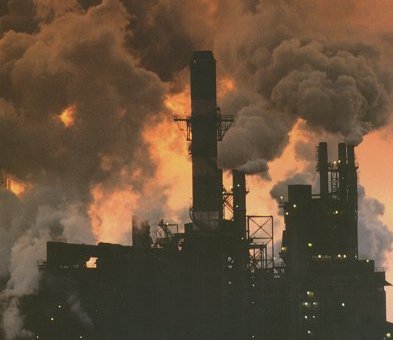 Burning of fossil fuels has released large amounts of carbon dioxide levels into Earth's
atmosphere. By reflecting heat back to the planet that would otherwise radiate out into
space, greenhouse gases such as CO2 and methane have warmed the Earth's land
surface and oceans (see global warming).
Burning of fossil fuels has released large amounts of carbon dioxide levels into Earth's
atmosphere. By reflecting heat back to the planet that would otherwise radiate out into
space, greenhouse gases such as CO2 and methane have warmed the Earth's land
surface and oceans (see global warming).
Fossil fuels (coal, oil, and natural gas) were formed hundreds of millions of years ago by primary producers long before there were any people. During the last century, humans have burned up much of these supplies. As human populations burgeon and economies grow, demand for limited supplies has driven up the price of oil. Although some delude themselves into thinking that oil replenishes itself by abiotic processes deep in the Earth, evidence for so-called "abiotic oil" is scant to non-existent (Glasby 2006). Fossil fuels are a finite resource and we are rapidly burning through them. We humans have become very dependent upon fossil fuels because they are portable, concentrated, and easily stored and transported. Essentially, they are our energy slaves. One gallon of gasoline moves a car weighing a ton 30-50 miles. Unfortunately, other energy sources, such as sun and wind, are not nearly as versatile. 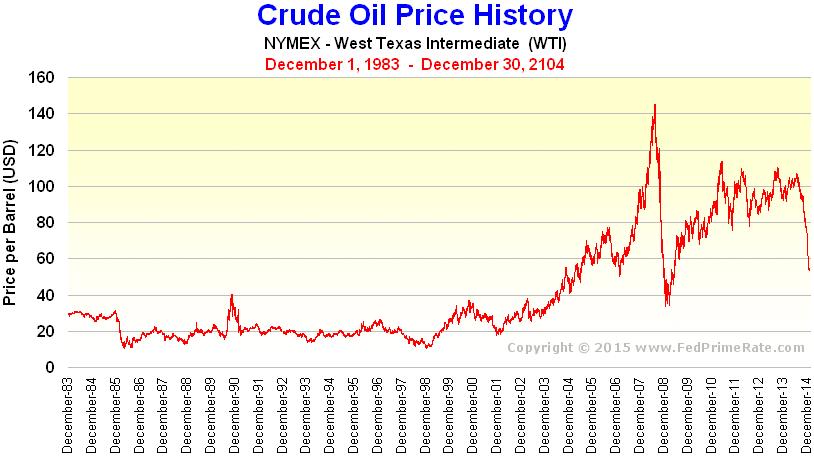
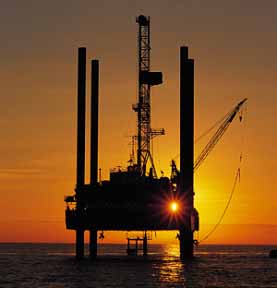 Some people, many under the payroll of big oil,
have asserted that oil supplies are adequate to get us through to the end of 2100.
Others have argued that we may be reaching the end of dwindling supplies in the face
of rapidly increasing world wide demand. This idea is known as
"Peak Oil Theory."
Some people, many under the payroll of big oil,
have asserted that oil supplies are adequate to get us through to the end of 2100.
Others have argued that we may be reaching the end of dwindling supplies in the face
of rapidly increasing world wide demand. This idea is known as
"Peak Oil Theory."
However, the so-called "peak oil" problem has now been replaced by a much more severe challenge of "unburnable oil". Global warming is happening faster than anticipated and the current goal of limiting global temperature rise to 2° C (3.6° F) by 2030 will require severe limitations on carbon dioxide emissions. Recent analyses have shown that, to meet this goal, massive amounts of known and predicted fossil fuels will have to remain unused (McGlade and Ekins 2013). The graph below shows estimates of the amounts of coal, naural gas, and oil in different regions -- dashed lines indicate the thresholds that cannot be exceeded if we are able to meet the current goal of limiting global temperature rise to 2° C by 2030. 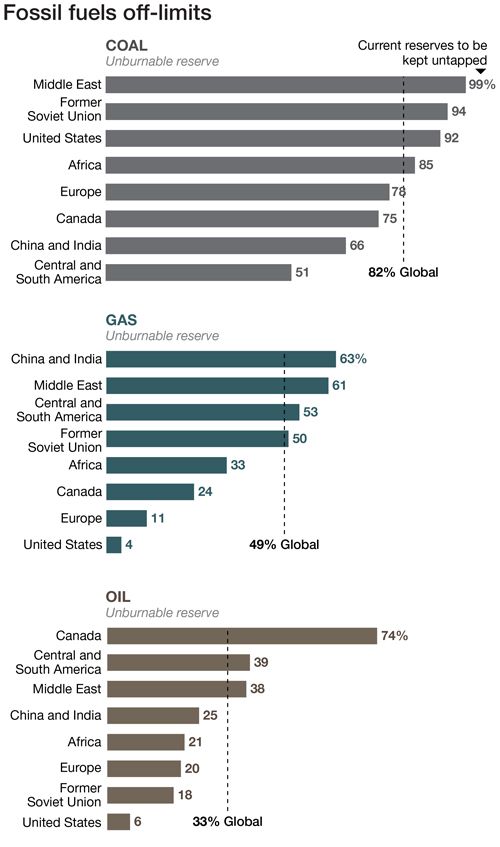
Canadian tar sands and the current debate over the Keystone Pipeline becomes highly relevant here (Scientists: Global Warming Likely to Surpass 2°C Target). Assessing "Dangerous Climate Change" Required Reduction of Carbon Emissions to Protect Young People, Future Generations and Nature. 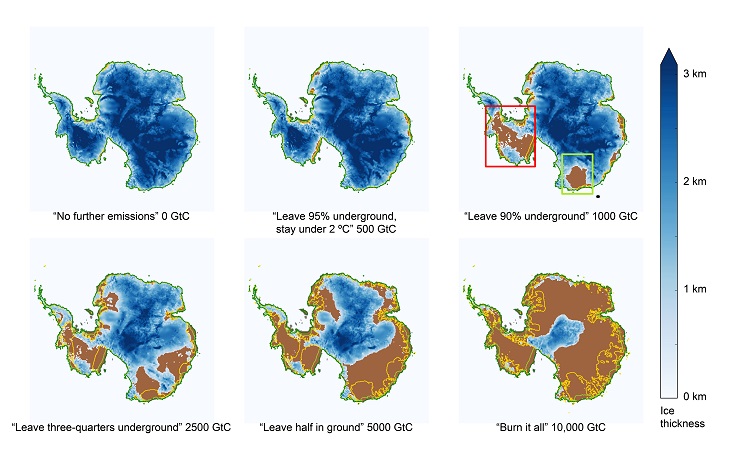 These will map into sea levels rising by up to 60 meters, enough to put New York, New Orleans, and Florida underwater.
These will map into sea levels rising by up to 60 meters, enough to put New York, New Orleans, and Florida underwater.
Until the advent of agriculture about 10,000 years ago, humans were hunter gatherers -- many fewer of us existed. Agriculture allowed massive increases in human population density, ultimately leading to the present day overpopulation crisis. We could never have reached 7+ billion without fossil fuels. Basically, humans exploited these one-time fossil energy reserves to demolish many of Earth's natural ecosystems and turn them into arable land and crops to feed increasing numbers of people. We replaced the tall grass prairies of North America with fields of corn and wheat and turned bison herds into cattle, ultimately into masses of humanity. The ancient deep black topsoils of the prairies made America a 'bread basket' for the world, allowing us to export grains to less fortunate peoples in other parts of the world without access to such amenable climates and rich soils. Sustained agriculture depletes the nutrient pools of soils -- in order to maintain production, soils must be fertilized with nitrogen and phosphorus and other minerals. Animal wastes such as bat and bird guano were used as fertilizers until they began to be depleted. Then, just as such natural fertilizers were running out, the Haber-Bosch process was discovered, which uses energy from burning natural gas to fix atmospheric nitrogen, essentially turning air into fertilizer. Without this technological breakthrough, human populations would have become limited by food supplies long ago and at much lower population densities. Technology lures us out on to thin ice, and we now face population overshoot. Our enormous population, now well above the level Earth can support, must soon crash, accompanied by famines and massive human misery. 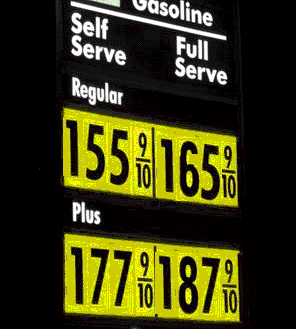 Americans have suffered from painful increases in the cost of gasoline at the pumps.
As a result, people are clamouring for alternative new sources of energy such as nuclear energy.
Many naively think that the "solution" to the energy crisis is access to more energy.
But this attitude displays ignorance of the laws of thermodynamics,
which must be obeyed. Using energy in any form always produces
waste heat, and unless it can be dissipated,
temperatures will rise. Earth can no longer dissipate the heat it receives from normal
incident solar radiation fast enough to stay in balance
(Hansen et al. 2005,
2013),
even without our adding insult to injury by burning fossil fuels and using nuclear reactors.
Our voracious appetite for energy coupled with our shortsightedness has put civilization
itself at risk. We and all of our fellow earthlings are now in dire peril.
Americans have suffered from painful increases in the cost of gasoline at the pumps.
As a result, people are clamouring for alternative new sources of energy such as nuclear energy.
Many naively think that the "solution" to the energy crisis is access to more energy.
But this attitude displays ignorance of the laws of thermodynamics,
which must be obeyed. Using energy in any form always produces
waste heat, and unless it can be dissipated,
temperatures will rise. Earth can no longer dissipate the heat it receives from normal
incident solar radiation fast enough to stay in balance
(Hansen et al. 2005,
2013),
even without our adding insult to injury by burning fossil fuels and using nuclear reactors.
Our voracious appetite for energy coupled with our shortsightedness has put civilization
itself at risk. We and all of our fellow earthlings are now in dire peril.
 Because people have electrical outlets all over their houses and
offices, they suffer from the illusion that electricity is clean energy,
infinite in supply and will always be there. None of these
assumptions is true -- unless we convert to an electrical system based on
renewable resources such as solar energy, power grids must ultimately fail
and the internet will cease to be. Whenever you turn on a light or an air
conditioner, fossil fuel is usually being burned to generate the electricity
you're using. A relatively small amount of electricity is
generated by other sources such as by wind, hydro-electric, and/or
solar energy. When you turn on a light, you are releasing solar
energy captured by plants millions of years ago -- essentially, you
are being illuminated by fossil sunlight that fell on the Earth long
ago. Unfortunately, electricity is difficult to store and usually must be
used immediately.
Battery technology to improve our ability to store electric energy has been painfully slow
(Storing Wind Energy --
Gravity Batteries).
Because people have electrical outlets all over their houses and
offices, they suffer from the illusion that electricity is clean energy,
infinite in supply and will always be there. None of these
assumptions is true -- unless we convert to an electrical system based on
renewable resources such as solar energy, power grids must ultimately fail
and the internet will cease to be. Whenever you turn on a light or an air
conditioner, fossil fuel is usually being burned to generate the electricity
you're using. A relatively small amount of electricity is
generated by other sources such as by wind, hydro-electric, and/or
solar energy. When you turn on a light, you are releasing solar
energy captured by plants millions of years ago -- essentially, you
are being illuminated by fossil sunlight that fell on the Earth long
ago. Unfortunately, electricity is difficult to store and usually must be
used immediately.
Battery technology to improve our ability to store electric energy has been painfully slow
(Storing Wind Energy --
Gravity Batteries).
Converting to a solar-powered electrical energy system would greatly reduce carbon emissions from the burning of non-renewable fossil fuels. Switching over to renewable sources of energy (wind and sun) would also make our electrical grid system more stable and reliable in the future but such a conversion won't be easy and could well be a total pipe dream (see also Foss: Renewable Energy: The Vision and a dose of reality). Of course, humans are clever, so clever that we have actually figured out how to turn matter into energy exploiting fission and fusion. Some seem to think that energy is available in infinite supply. Nuclear energy is virtually limitless, but it carries serious environmental hazards (particularly thermal pollution and radioactive waste). Access to unlimited energy would lead to our downfall (see below). Unlimited cheap clean energy, such as that so ardently hoped for in the concept of cold fusion, would actually be one of the worst things that could possibly befall humanity. Such energy would enable well meaning but uninformed massive energy consumption and habitat destruction (i.e., mountains would be leveled and terraced, massive water canals would be dug, ocean water distilled, water would be pumped and deserts turned into green fields of crops). Human populations would grow even higher until the last vestiges of natural habitats are all destroyed. Heat dissipation will of course set limits, for when more heat is produced than can be dissipated, the resulting thermal pollution will quickly warm the atmosphere and oceans to the point that all life is threatened, the ultimate man-made ecocatastrophe. Humans could have been real stewards of Earth and taken care of all its many denizens, microbes, plants, fungi and animals. If we had used our ability to think and care, we could have been God-like. Instead, for a short-sighted and selfish transient population boom, we became rapists and the scourge of the planet. We wiped out and usurped vast tracts of natural habitat. We ate any other species that was edible and depleted many of Earth's multitude of natural resources. In a single century, humans burned up fossil fuels that took millions of years to form. We fouled the atmosphere, despoiled the land, and poisoned the waters, making the planet virtually uninhabitable even to ourselves (Can Humans Share Spaceship Earth? -- Pianka, 2012). Despite our many shortcomings, we are smart, smart enough to recognize that we have dangerous instincts, and smart enough to control those instincts, but we just don't seem to care enough even to try. The disparity between what humans could have been versus what we actually have become is tragic and unforgivable. If only people would live up to their full potential -- all it would take is using our brains to think, care, and try. Our economic system based on continual growth must be replaced by a sustainable system where each of us leaves the planet in the same condition that it was in before we were born. This will require many fewer of us and much less extravagant lifestyles. We won't be able to move around so freely (airplanes will become a thing of the past) and we will have to go back to walking and riding bicycles or horses. In addition, humans will have to be more spread out, living without big cities. Before it is all over, we are going to have to grow our own crops, limit our own reproduction, un-invent money, control human greed, and revert back to trade and barter, among other things (see also On Human Nature and Can human instincts be controlled?). If, as seems highly likely, humans prove unable to find the willpower needed not to burn these fossil fuel reserves, we will race ahead and complete the destruction of this, our one and only, Spaceship. Global temperatures will continue to soar well past the 2° C (3.6° F) limit, long frozen ice will continue to melt, sea levels will rise dramatically, innudating low lying islands and coastal cities. Oreskes and Conway (2014) detail this horrific scenario in " The Collapse of Western Civilization: A View from the Future". Links: 
Last updated 16 January 2015 by Eric R. Pianka 
|